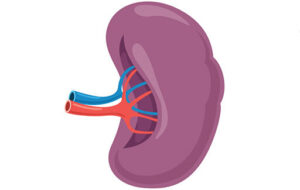Understanding The Immune System Parts

What is the Immune System?
The immune system is a complex network of organs, cells, and tissues that protects the body against foreign substances such as bacteria, viruses, pollen, and toxins. It is made up of physical barriers such as the skin, gastrointestinal tract, respiratory system, and eyelashes; defense mechanisms such as secretions, mucous, bile, gastric acid, saliva, tears, and sweat; and cells called lymphocytes that attack foreign cells and antibodies that help it identify foreign cells. These work together to protect the body from infection.
In lymphocytes, there are two types of white blood cells: the lymphocytes (which make antibodies) and the neutrophils (which fight bacterial infections). Antibodies are proteins the immune system produces in response to antigenic molecules or foreign invaders.
They tag the invader for destruction by other parts. The innate system of immune system includes skin and other barriers such as mucus membranes. This part helps recognize and respond to pathogens such as bacteria or parasites before they can cause damage.
Sleep is a fundamental physiologic process regulated by immune mediators called cytokines. Sleep plays a role in host defense and asthma exacerbation.
How Does the Immune System Work?
The body’s immune system is responsible for defending against foreign invasions and inflammation. It involves the response of tissues and organs that work together to prevent infection and inflammation. When the immune system functions correctly, it does not allow foreign microbes to enter the body and cause harm. The first line of defense, the skin, does this.
The body’s skin has many cells protecting it from harmful substances. These are known as skin immunocytes. They play an essential role in the response of the body. After an antigen comes into contact with these, they become activated and produce chemicals that help it recognize and fight foreign substances. These also make antibodies that help to lock onto specific antigenic targets.
The killer lymphocytes, or T cells, play a significant role in the body’s immunity response. Antibodies and antigenic targets trigger these. Once activated, they circulate in blood where they can recognize white blood cells called B lymphocytes exposed to antigenic targets such as infection or inflammation (antigens). They make antibodies that lock onto antigens and target them for destruction once they have been recognized by white blood cells called macrophages (monocytes).
This way, white blood cells can eliminate infection or inflammation without causing harm to the surrounding tissues of the body.
Different types of immune response
The immune system comprises a range of antibodies that work together to fight off harmful pathogens in the body. It comprises two main types of immune response: innate immunity and adaptive immunity. Innate immunity relies on the body’s natural defenses, such as neutrophils, monocytes, natural killer cells, and complement proteins. In contrast, adaptive immunity relies on trained lymphocytes, such as T cells and B cells.
This type of immunity is more effective at fighting specific types of pathogens and requiring memory cells from previous encounters with the same antigen or virus to be effective. These cells can remember the pathogen and react faster than innate immune cells. For example, antibodies are part of the adaptive immune system and vary in structure and function according to their immunoglobulin class.
Dendritic cells are a type of cell in the immune system that play a role in innate and adaptive immunity. They are part of the body’s response to infection. Dendritic cells phagocytose pathogens and present them to T cells, activating the adaptive immune response.
Mucous membranes line the inside of the body, including the nose, mouth, throat, and gut. They produce mucus which helps to protect against infection. Mucous membranes are a first line of defense against pathogens and help to prevent them from entering the body.
Components of the Immune System
The immune system is the body’s system of cells and biochemical processes that protect against infection by identifying invaders and destroying them. It consists of white blood cells, the bone marrow, the lymphatic system, tonsils, adenoids, the thymus gland, the spleen, bone marrow, lymph nodes, and antibodies. These help fight infections by secreting cytokines (chemical messengers) and other immunoglobulin proteins.
The immune system also includes physical barriers such as the skin, the gastrointestinal tract, and the respiratory tract. A person’s immune system can be stimulated to respond to different types of invaders or pathogens, such as bacteria, fungi, or viruses.
Many parts work together to protect the body from infection. The inflammation response involves cells secreting inflammatory cytokines that cause inflammation. The response helps remove debris and damaged cells from the body. Complement proteins play a role in the immune system’s response to infection by mediating the response. Non-specific cell immunity involves white blood cells recognizing and killing antigen-presenting cells called macrophages infected with parasites.
The immune system protects the body from infection by destroying invaders and regulating inflammation.
Antibodies
Antibodies are the antibodies produced by the immune system, responsible for recognizing and destroying harmful microorganisms. An antibody is a unique protein that may identify and attach to foreign microorganismal molecules, leading to the destruction of the infection. There are five major classes of antibodies (IgG, IgA, IgM, IgD, and IgE) and four subclasses of antibodies (IggG1, IgG2, IgG3, and IgG4). Each of the antibodies has a different function in the immune system. For example, IgG antibodies act primarily as antibodies that bind to foreign antigenic molecules, while IgA antibodies mainly help destroy pathogens by forming lipid antigen complexes.
B cells
B cells are the cells of the immune system that produce antibodies. These antibodies are the critical component of the immune response, fighting foreign pathogens and other proteins that may cause harm to the body. B cells develop in the bone marrow and are trained not to attack healthy tissues, instead targeting specific antigen molecules from foreign pathogens. Once activated and ready for action, B cells respond to foreign germs (antigens) by maturing into plasma cells or memory cells, which can create antibodies that fight viruses and bacteria.
B cells play an essential role in the immune system by creating antibodies to combat foreign pathogens. They are part of the adaptive immune response, which learns how to recognize different types of foreign proteins and respond with antibodies to fight those proteins in the future. In this way, antibodies help protect the body against invader threats such as viruses, bacteria, or parasites.
Bone Marrow Lymphocytes
Bone marrow is the origin of the immune system, including white blood cells known as lymphocytes. These lymphocytes are responsible for fighting off infections and inflammation in the body. One of bone marrow’s most essential roles is to produce both T lymphocytes and B lymphocytes, which help protect the body from infection. Additionally, bone marrow is necessary for making all blood cells in the body, including T and B lymphocytes. These help the body defend against pathogens and foreign cells.
T lymphocytes and B lymphocytes are both types of white blood cells that function in the immune system. They play critical roles in defending the body against foreign threats by identifying and destroying harmful or threatening ones.
Lymphatic system
The lymphatic system is a vital part of the immune system and is critical in developing immunity. It comprises lymph nodes, lymphatic vessels, and the thoracic duct. Lymphocytes in bone marrow, thymus, and spleen help the body remember previous invaders and recognize any foreign cells or tissue that may be present. These cells also help to respond to newly encountered threats.
The lymphatic system also has other functions, including processing white blood cells and managing fluid levels in the body. In addition to lymphocytes, natural killer (NK) cells are also lymphocytes that play an essential role in the immune response.
Spleen
The spleen is the largest internal organ of the immune system and is responsible for filtering pathogens from the blood. It is critical in protecting people against bacterial infections, such as meningococcus and pneumococcus. The spleen is also crucial for its ability to make fighting components of the immune system, including antibodies and lymphocytes. The spleen provides antibodies that help fight against infection, lymphocyte cells that allow it to destroy harmful cells and tissues, and white blood cells which fight off foreign invaders.
The spleen is an essential blood-filtering organ that removes microbes and old or damaged red blood cells from the blood. It ensures that the blood has enough to fight infection. In addition to its immune system functions, the spleen makes antibodies that help fight against infection.

T cells
T cells are white blood cells of the immune system originating from bone marrow hematopoietic stem cells. They are a critical component and are essential in defending against infection by foreign pathogens. T cells can directly attack cells infected with viruses and act as immune system regulators. They can also mature into memory cells, which allow a rapid response if the same infection is encountered again. T cells can be used in cell and gene therapy, such as chimeric antigen receptor (CAR) T cells or engineered T-cell receptor therapy (TCR). These therapeutic approaches use T cells to target specific issues.
Thymus
The thymus is an integral part of the immune system located behind the sternum and between the lungs. It produces the hormone thymosin, which aids in producing T-cells, white blood cells that fight infection and inflammation. T-cells in the thymus are trained to recognize foreign antigens and ignore the body’s antigens. It helps it maintain the delicate balance between attack and defense.
The thymus also filters and monitors the blood content, protecting against harmful pathogens while allowing healthy cells to flourish. The thymus plays a critical role in immunity by training immune cells to fight infection.
White blood cells
White blood cells, also known as leukocytes or lymphocytes, are essential to the immune system. White blood cells are responsible for the immune response; they travel through the blood and lymphatic vessels in the body to search for antigens and launch an attack.
White blood cells include lymphocytes such as B-cells, T-cells, and natural killer cells. In addition, phagocytes are white blood cells that ingest invaders and destroy them. These are stored in lymphoid organs, including the thymus, spleen, and tonsils. Without white blood cells, the immune system could not fight off harmful pathogens and maintain healthy immunity.
The bloodstream is home to many white blood cell types that travel around the body to fight infection. Bone marrow and thymus are essential in the development of these. Lymphocytes are a type of white blood cell that helps protect the body from infection. They mature in bone marrow or thymus and enter the bloodstream, circulating throughout the body.
Tips to Boost The Immune System
Having a robust immune system is vital for the health of the body. That’s because the immune system protects the body from foreign substances and cells that may be harmful, such as bacteria and viruses.
Eat a balanced diet, get regular exercise, and get enough sleep. Additionally, avoid environmental triggers, such as cigarette smoke, heavy metals, and pollution, and take topical corticosteroids to prevent overstimulation. Vitamin C, zinc, and selenium are also beneficial nutrients besides natural remedies, including herbs, probiotics, and omega-3 fatty acids in lifestyle support for the immune system.
Benefits of having a robust immune system
A robust immune system can provide lifelong immunity. Exposure to pathogens, such as bacteria and viruses, helps the body develop immunity against them. The response helps the body recognize and defend against foreign and harmful substances. A robust immune system can help protect against severe problems like measles.
A robust immune system allows the body to fight off infection and inflammation long-term. A strong immune system is vital for maintaining health and well-being and can significantly contribute to overall health and well-being.
What foods help to strengthen the immune system?
Improving the immune system’s health is crucial for maintaining a healthy body. A healthy diet can help provide the vitamins and minerals necessary to function correctly. In addition, a varied and healthy diet that includes fruits and vegetables, nuts and seeds, whole grains, dairy, and lean proteins can help support the immune system. Other particularly beneficial foods include citrus fruits, garlic, ginger, turmeric, spinach, yogurt, and almonds. Additionally, fatty fish, peppers, broccoli, mushrooms, and beans can help strengthen the immune system.
A diverse and healthy diet can help provide the nutrients the immune system needs to function correctly. It is essential to incorporate these foods into daily routines to help support the immune system’s health.
What Are The Common Causes Of Immunodeficiency?

Innate immunity refers to immunity that is present at birth. An innate immune system is non-specific in that it recognizes any foreign invader and does not require antibodies for protection. However, innate immunity does not last forever, and acquired immunity must be continually generated through the training of antibodies through exposure to the antigen of the specific invader. Finally, adaptive immunity refers to antibodies generated by a response to antigenic stimulation. These antibodies target specific threats and help protect the body from infection and inflammation.
These types of immunodeficiencies can be caused by genetic factors or environmental factors such as bacterial infection. The most common causes of weakened immunity are failure of host defense mechanisms.
How Does Stress Affect Immunity?
A person under chronic or prolonged stress can experience the immune system weakening, making it less able to fight infection and illness. It is due to the effects of stress on the body, including the hypothalamic-pituitary-adrenal (HPA) axis.
The HPA axis is a natural response of the body to stressors such as fear and anxiety, which includes the release of the hormone cortisol from the adrenal glands. Cortisol acts as a natural immunosuppressant by suppressing inflammation and dendritic cell activity. It decreases lymphocyte proliferation, lymphocyte cytokine balance, and neutrophil chemotaxis. Cortisol also increases hypoxia-inducible factor (HIF)-1α expression in macrophages, which can suppress antigen presentation on antigen-presenting cells.
Finally, chronic stress can cause changes in the function of immunological cells, leading to a decreased immune response to antigens. At this point, it’s essential for individuals experiencing chronic or severe levels of stress to seek medical attention.
Are there any lifestyle changes to improve the immune system?
Yes, several lifestyle changes can improve the immune system. The first and foremost of these is to ensure to get enough sleep and regular exercise during the day. Getting sufficient sleep helps the body to rest and recuperate, allowing the immune system to better fight off infection. Additionally, regular exercise helps keep the body healthy and boosts immunity.
Besides this, it’s also essential to maintain a healthy body mass by eating nutritious foods and avoiding smoking or drinking alcohol. Eating lean proteins such as fish, eggs, or dairy products will help provide the body with the necessary nutrients to stay strong and healthy. Additionally, whole foods, fresh fruit, and vegetables are great immune system-boosting snacks that can be readily found in any grocery store.
The Immune System Parts And Functions
The immune system is the strongest defense system in the body. It helps to fight off foreign invaders, like bacteria, fungi, and viruses. It also helps fight off unwanted cells and other things that could potentially cause harm to the body. So taking care of the immune system is essential by eating a healthy diet, getting enough sleep, exercising regularly, and managing stress. BioScan can help manage stress by providing individuals with a comprehensive overview of their health. It can help identify potential areas of concern and allow for early intervention.
